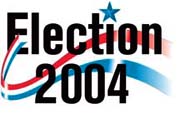
Dems rebound
in Kona, on Maui
An analysis shows that
many former GOP strongholds
now have Democratic legislators
The 2004 general election reversed a trend of the neighbor islands going Republican, partly because of a successful get-out-the-vote campaign by Hawaii Democrats.
Republicans' hopes to win a base in Hilo with the election of Andy Smith collapsed in Tuesday's general election as Democrat Clifton Tsuji, a Hilo banker, won the House seat vacated by Eric Hamakawa.
On the Big Island, GOP incumbent Rep. Mark Jernigan lost. On Maui, two GOP incumbents, Reps. Brian Blundell and Kika Bukoski, also were toppled. The lone House Republican on the neighbor islands is Rep. Chris Halford (Makena-Kihei).
Gov. Linda Lingle, a former GOP mayor of Maui, was a prominent part of many Republican campaigns, as she helped candidates raise money and organize their efforts. Lingle had strong neighbor-island support when she won the 2002 election, especially in the Kihei and Kona areas.
But her campaigning effort this year failed to put in any of the newcomers that the GOP had targeted to beat Democrats.
The neighbor-island slide to the Democrats was just as evident in the precinct tallies for the presidential race.
The 18th House District, from Keauhou to Honokohau, contains some of the strongest GOP districts in the state, but this year it voted for Sen. John Kerry over President Bush, 5,703 to 5,365.
Republicans noted that although the party holds the governorship, Democrats are still the majority.
"The strength of the absentee ballot programs by the Democrats combined with the unions seemed to be stronger than ours," GOP chairman Brennon Morioka said. "There are so many unions and on our side, it is just the party."
Democrats benefited from a strong get-out-the-vote program that registered new and younger voters.
The program showed in the increased votes cast, with a record 432,000 people voting in Hawaii in the general election. The second-highest voter turnout was in the 1998 general election when 413,000 voted.
Both the Democratic Party and labor worked to register new voters and also to encourage voters to vote early by mail. Absentee voters made up 20 percent of the voter base, compared with 14 percent in the 2002 general election.
The new and younger voters helped to keep Hawaii in the Democratic presidential column despite statewide polls before the election that showed the race even.
According to an Associated Press exit poll of 622 voters in Hawaii, Kerry was the strong winner with younger voters, taking 61 percent of those between the ages of 18 and 29.
While voters as a whole picked Kerry instead of Bush by 232,000 to 194,000, the final results showed that Kerry enjoyed a wider margin of support on the neighbor islands, where he earned 60 percent of the votes on Kauai, Maui and Hawaii.
Oahu voters, in contrast, supported Kerry by 50 percent to 48 percent for Bush.
Lanikai, one of the most Republican neighborhoods on Oahu, voted for Kerry, 511 to 461.
That Democratic leaning also extended to the race for the state House, in which Rep. Tommy Waters, (D, Kailua-Waimanalo) beat Republican Wilson "Kekoa" Ho. In the Lanikai district, Waters topped Ho, 524 to 416.
Republican incumbents are now saying that they had worried Republicans in other races would lose votes because of Kerry.
Sen. Fred Hemmings, GOP leader, said voters turned to Kerry because they didn't like Bush, and it drove up the entire voter turnout.
If the GOP had a bright spot, it was in the normally Democratic area of Ewa Beach, where Bush won every precinct and newcomer Kymberly Pine beat Democratic incumbent Rep. Romy Mindo, 5,006 to 3,327.
www.hawaii.gov/elections
